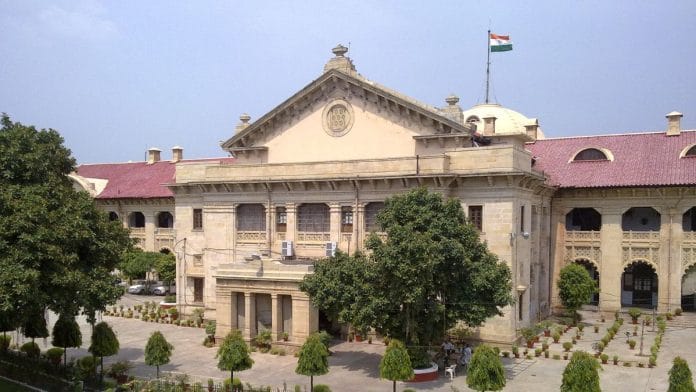New Delhi: The Allahabad High Court has granted bail to a man accused of luring a 15-year-old girl on the false promise of marriage and impregnating her.
Granting bail to the accused, a single-judge bench of Justice Krishan Pahal ruled that the applicant is “being released on bail on the assurance of the learned counsel for the applicant that he shall marry the victim within three months from his release from jail and take care of her as well as the newborn baby”.
In Abhishek vs. the State of UP, the Allahabad High Court was dealing with the bail petition of a man accused of offences under sections 376, 506 and 5(J)(II) of the Protection of Children from Sexual Offences (POCSO) Act, 2012, which relate to punishment(s) for rape, criminal intimidation and impregnation of a female child as a consequence of sexual assault, respectively.
The man, in the present case, was accused of having “fleeced and fooled” the complainant’s daughter, aged 15, and establishing a physical relationship with her on the false promise of marriage, the prosecution said.
Subsequently, the minor was said to have been impregnated as a result of the relationship, and the accused later refused to comply with the promise of marriage, and even threatened her, the complainant alleged.
What the court ruled
In its ruling dated 18 September, the court cited its 2022 decision in Ramashankar vs. the State of U.P where it said, “Both the accused and the victim are of very young age and have barely attained the age of majority. A baby girl has been born out of their wedlock. Though, the marriage may not be described as per the law of the land, but the Court has to apply a pragmatic approach in such conditions and indeed both the families are required to act practically. A lot of water has flown down the Ganges. Now, it’s time to move ahead.”
In that case, both the parties were of a young age, and a baby was born out of wedlock. However, the court said that a pragmatic approach should be applied in such conditions.
Explaining that the youth “became victim to the legal parameters though rightly framed by the legislature”, the court said it was being drawn to make an exception in the extraordinary circumstances of the case. A hypertechnical and mechanical approach shall do no good to the parties, the court added.
Similarly, in Atul Mishra vs. the State of U.P (2022), the court also did away with stringent POCSO provisions, citing extraordinary circumstances.
In the present case, too, the court said that the challenge lies in distinguishing between genuine cases of exploitation and those involving consensual relationships. “This requires a nuanced approach and careful judicial consideration to ensure justice is served appropriately.”
The court cited what it termed a well-known principle of “Presumption of Innocence Unless Proven Guilty”, as laid down by the Supreme Court in Satender Kumar Antil Vs. Central Bureau of Investigation (2022), which gave rise to the concept of bail as a rule and jail as the exception.
It also relied on the fundamental right to life under Article 21 of the Constitution, to say that no one’s life or personal liberty may be taken away unless procedure established by law is followed.
Accepting the bail plea of the accused, the court imposed certain conditions on his release. The conditions were that the accused be released on bail on the assurance that he would marry the victim within three months of his release and take care of her and her baby. The court also directed the accused to pay a sum of Rs 2 lakh in the name of the newborn baby, till the minor attains the age of majority.
(Edited by Radifah Kabir)






